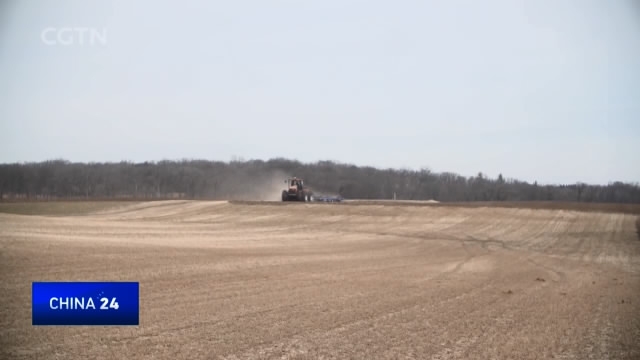
20:38, 05-Apr-2018
US-China Trade Tensions: American Midwest braces for impact of tariffs

Meanwhile, the proposed Chinese tariffs could be felt by America's auto industries and farms in the midwest. Pork and soybean groups say Beijing's move could seriously hurt the agricultural sector. CGTN's Dan Williams has more from the state of Illinois.
Feeding time at a pig farm in Illinois. These pigs are a little under two months away from going to market. But by then, the marketplace could look dramatically different.
China's decision to impose retaliatory tariffs on a range of products, including a 25% tariff on US pork, comes as a countermeasure on the proposed tariff increases on Chinese imports by the US. But if that threat is carried through, the blow to the US pork industry could be severe.
JENNIFER TIREY ILLINOIS PORK PRODUCERS "Essentially, 149 dollars is what the average marketed hog value is. And 53 dollars of that is essentially for exports and with China being our number two market, that would really hurt the economy and our US pig farmer."
It's not just the pork industry that is deeply concerned. US soybeans was included in the second wave of China tariffs. That market is worth an estimated fourteen billion dollars to US farmers.
MARK ALBERTSON ILLINOIS SOYBEAN ASSOCIATION "It is our number one customer. Here in Illinois, we grow more soybeans than any other state. And most of those get exported. So it is our biggest customer by far. China buys more of our soybeans than all of the other countries combined."
The tariffs bring doubt to US agriculture. As farmers begin preparing their seedbeds, many are concerned as to what price those commodities will fetch come harvest time.
JULIAN DIAZ QUINLAN SCHOOL OF BUSINESS, LOYOLA UNIVERSITY "The Chinese market is so important that the effects on American farmers would be significant. Another possible effect of this, that given the size of the China market, American farmers would want to lower their prices which had already been on the decline so that the effects of the tariff would not be perceived as being that intense on the Chinese market. So that would be another negative effect on the producers."
DAN WILLIAMS POLO, ILLINOIS "The threat of the tariffs has caused uncertainty here. And there is a real concern that once a market disappears then it is difficult to bring it back."
It's not just farming that will be concerned about a potential loss of market. The US auto industry could also be hit by a 25% tariff. The US exported more than 267,000 cars and light trucks to China last year.
While a tariff on aircraft could impact US air-giant Boeing. China is Boeing's biggest export market. The U.S. state of Kentucky will be concerned by the tariffs on bourbon as well as tobacco.
The tariffs have not yet come into effect but already global markets have been hit hard by the escalating trade battle. American business groups have urged the two sides to engage in talks and avoid an all-out trade war. But for the moment there is simply doubt and concern. Dan Williams CGTN Chicago

SITEMAP
Copyright © 2018 CGTN. Beijing ICP prepared NO.16065310-3
Copyright © 2018 CGTN. Beijing ICP prepared NO.16065310-3